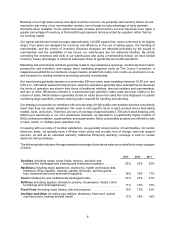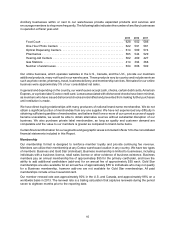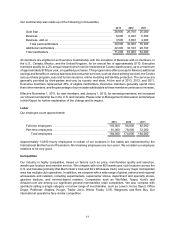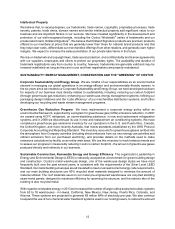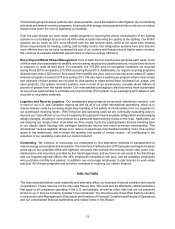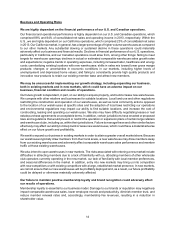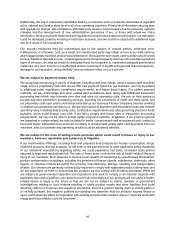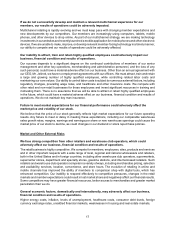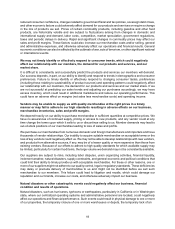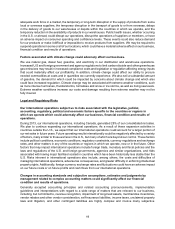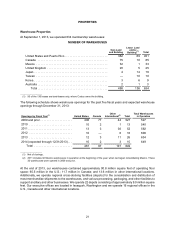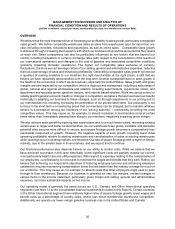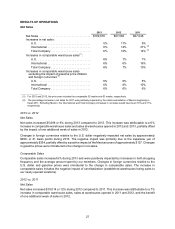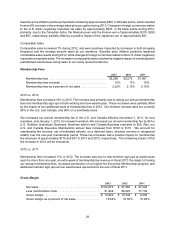Costco 2013 Annual Report Download - page 21
Download and view the complete annual report
Please find page 21 of the 2013 Costco annual report below. You can navigate through the pages in the report by either clicking on the pages listed below, or by using the keyword search tool below to find specific information within the annual report.
19
adequate work force in a market, the temporary or long-term disruption in the supply of products from some
local or overseas suppliers, the temporary disruption in the transport of goods to or from overseas, delays
in the delivery of goods to our warehouses or depots within the countries in which we operate, and the
temporary reduction in the availability of products in our warehouses. Public health issues, whether occurring
in the U.S. or abroad, could disrupt our operations, disrupt the operations of suppliers or members, or have
an adverse impact on consumer spending and confidence levels. These events could also reduce demand
for our products or make it difficult or impossible to receive products from suppliers. We may be required to
suspend operations in some or all of our locations, which could have a material adverse effect on our business,
financial condition and results of operations.
Factors associated with climate change could adversely affect our business.
We use natural gas, diesel fuel, gasoline, and electricity in our distribution and warehouse operations.
Increased U.S and foreign government and agency regulations to limit carbon dioxide and other greenhouse
gas emissions may result in increased compliance costs and legislation or regulation affecting energy inputs
that could materially affect our profitability. In addition, climate change could affect our ability to procure
needed commodities at costs and in quantities we currently experience. We also sell a substantial amount
of gasoline, the demand for which could be impacted by concerns about climate change and which also
could face increased regulation. Climate change may be associated with extreme weather conditions, such
as more intense hurricanes, thunderstorms, tornadoes and snow or ice storms, as well as rising sea levels.
Extreme weather conditions increase our costs and damage resulting from extreme weather may not be
fully insured.
Legal and Regulatory Risks
Our international operations subject us to risks associated with the legislative, judicial,
accounting, regulatory, political and economic factors specific to the countries or regions in
which we operate which could adversely affect our business, financial condition and results of
operations.
During 2013, our international operations, including Canada, generated 28% of our consolidated net sales.
We plan to continue expanding our international operations. As a result of these expansion activities in
countries outside the U.S., we expect that our international operations could account for a larger portion of
our net sales in future years. Future operating results internationally could be negatively affected by a variety
of factors, many similar to those we face in the U.S., but many of which are beyond our control. These factors
include political conditions, economic conditions, regulatory constraints, currency regulations and exchange
rates, and other matters in any of the countries or regions in which we operate, now or in the future. Other
factors that may impact international operations include foreign trade, monetary and fiscal policies and the
laws and regulations of the U.S. and foreign governments, agencies and similar organizations, and risks
associated with having major facilities located in countries which have been historically less stable than the
U.S. Risks inherent in international operations also include, among others, the costs and difficulties of
managing international operations, adverse tax consequences, and greater difficulty in enforcing intellectual
property rights. Additionally, foreign currency exchange rates and fluctuations could have an adverse impact
on our future costs or on future profits and cash flows from our international operations.
Changes in accounting standards and subjective assumptions, estimates and judgments by
management related to complex accounting matters could significantly affect our financial
condition and results of operations.
Generally accepted accounting principles and related accounting pronouncements, implementation
guidelines and interpretations with regard to a wide range of matters that are relevant to our business,
including, but not limited to, revenue recognition, impairment of long-lived assets, merchandise inventories,
vendor rebates and other vendor consideration, self-insurance liabilities, income taxes, unclaimed property
laws and litigation, and other contingent liabilities are highly complex and involve many subjective


